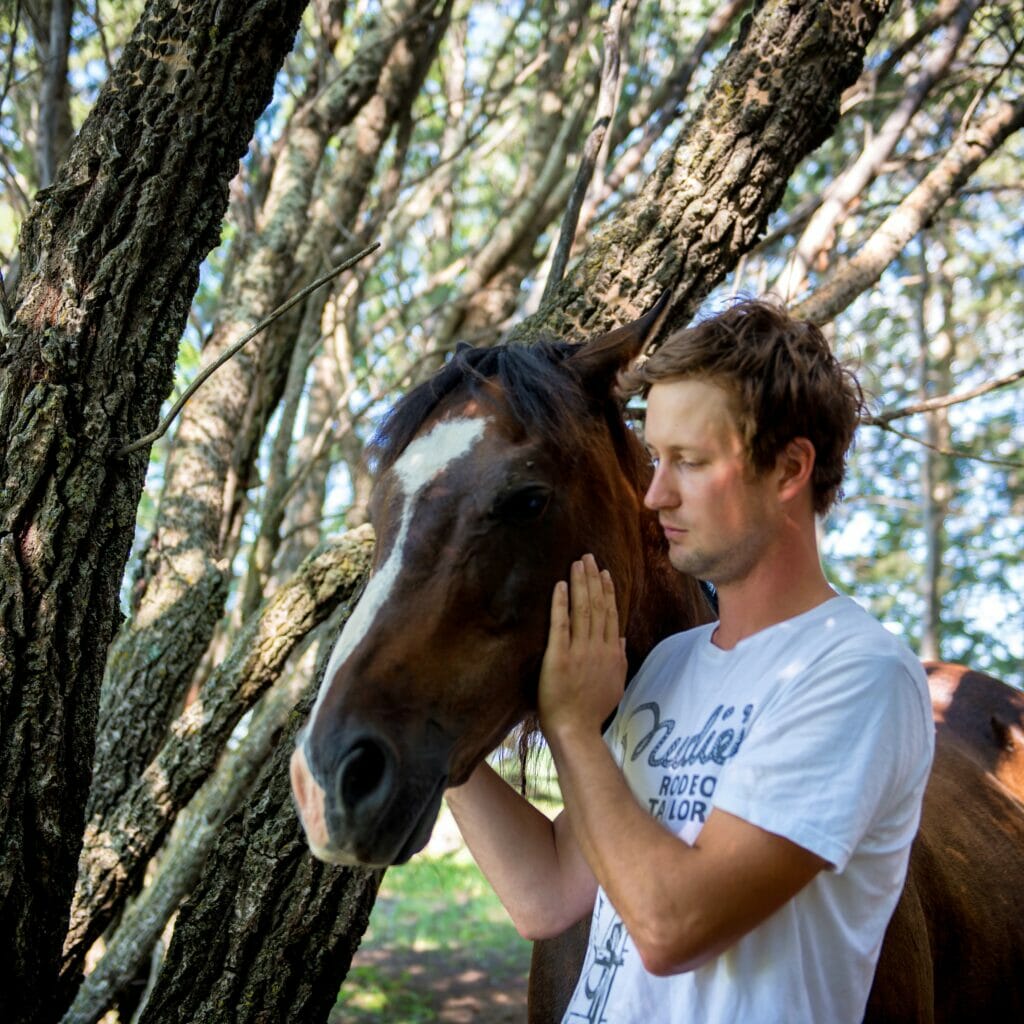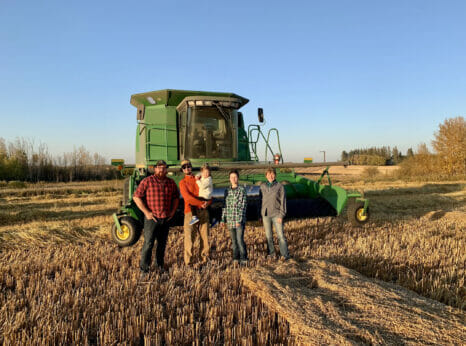Farmer by Day, Rockstar by Night. How Del Barber Jumps Between Two Worlds
On his new album, Barber reflects on farming and family, using music to bridge the gap.
Farmer by Day, Rockstar by Night. How Del Barber Jumps Between Two Worlds
On his new album, Barber reflects on farming and family, using music to bridge the gap.

Del Barber at home on the farm.submitted.
On “Still Got You,” Del Barber croons about watching the stars and picking tomatoes. It’s the simple things he holds tight, too, but there’s a wistfulness in his voice. “The best things we have, we just didn’t earn,” he sings. The song wrestles with how grateful Barber is for the life he leads, while recognizing that so many folks have so much less.
It’s that sense of reflection that carries through Barber’s seventh studio album, Almanac. While it might seem like a love song about a person, it’s actually written for his home: specifically, the farm and ranch he shares with his wife and family in rural Manitoba. When Barber isn’t touring with his band or in the studio recording music, he’s working the 2,000-acre farm with cattle, chickens, row crops and cut flowers.

It can be difficult to balance his two lives: that of an award-winning musician who tours through the US and Canada regularly, and that of a farmer and rancher with a working farm and business. “Over the years, I’ve developed a relationship where I can come and go from the farm…I pick particular jobs on the farm and commit to doing them,” says Barber. For instance, he’s the designated fence guy—each spring, he’ll fence all the pastures. Whether he’s touring or home, he’ll schedule that work in, so everyone else can focus on the day-to-day.
The work also helps Barber write his music; the repetitive nature of farming acting as a sort of meditative process. “During harvest time, I’m hauling grain, or I’m in the combine and I don’t have anyone else around. My mind immediately starts to work on songs,” says Barber. “In terms of the music, it’s a symbiotic relationship. I get to do something completely different. It’s physical, it’s outside and it gives me something to write about.”

It also keeps him humble. Sure, as Barber will tell you, he may not have the star power of a Chris Stapleton or a Maren Morris, but performing music for applauding audiences doesn’t have much in common with shoveling cow manure or weeding the garden beds. “I definitely feel like there’s a distinct wake-up call every time I come home and have to go back to the farm,” says Barber. “Sometimes, music seems like a really important pursuit. And other times, when you watch a calf that you’ve been trying to keep alive for a week, in the ice and snow, and it dies—It gives me perspective on my own life and career and it makes me realize that I’m pretty small potatoes.”
Despite that occasional self-deprecation, Barber does strive to forge connections in his music, particularly bridging the divide between urban and rural communities. “I want to celebrate rural life and dispel some of the myths of it,” says Barber. “I want to tell the truth about my experience, the good and the bad, and try to make the conversation between urban and rural people have an ounce of nuance. Oftentimes, I just feel like it’s just so politicized, especially in the United States. I just feel like so often, both parties just don’t understand each other.”
Despite his efforts to bring those two communities closer together now, Barber didn’t grow up on a farm. He grew up in a suburban town just on the edge of Winnipeg, in the center of Canada, but he was always drawn to farm life. His first jobs were as farm laborer on u-pick strawberry farms and driver for grain farmers. He started working harvests on big farms close to the border with North Dakota. And, through all of this, he was playing in bands and writing songs. They all touched on rural life, from his debut Where The City Ends in 2010 to 2014’s Prairieography, which netted him Songwriter of the Year at the Western Canadian Music Awards.
Barber’s talent is in noticing and highlighting the granular—the small details that make up his everyday life—cooking for his family, tending to the cows, clearing pasture. These are what make his songs resonate. That’s why the title Almanac works so well for the latest album. The songs are both a record of how life is now and a prediction for the future. “[Almanacs] are informed by history. Predictions are informed by what’s happened before, and I think good music does that as well.”
Follow us

This work is licensed under a Creative Commons Attribution-NoDerivatives 4.0 International License.
Want to republish a Modern Farmer story?
We are happy for Modern Farmer stories to be shared, and encourage you to republish our articles for your audience. When doing so, we ask that you follow these guidelines:
Please credit us and our writers
For the author byline, please use “Author Name, Modern Farmer.” At the top of our stories, if on the web, please include this text and link: “This story was originally published by Modern Farmer.”
Please make sure to include a link back to either our home page or the article URL.
At the bottom of the story, please include the following text:
“Modern Farmer is a nonprofit initiative dedicated to raising awareness and catalyzing action at the intersection of food, agriculture, and society. Read more at <link>Modern Farmer</link>.”
Use our widget
We’d like to be able to track our stories, so we ask that if you republish our content, you do so using our widget (located on the left hand side of the article). The HTML code has a built-in tracker that tells us the data and domain where the story was published, as well as view counts.
Check the image requirements
It’s your responsibility to confirm you're licensed to republish images in our articles. Some images, such as those from commercial providers, don't allow their images to be republished without permission or payment. Copyright terms are generally listed in the image caption and attribution. You are welcome to omit our images or substitute with your own. Charts and interactive graphics follow the same rules.
Don’t change too much. Or, ask us first.
Articles must be republished in their entirety. It’s okay to change references to time (“today” to “yesterday”) or location (“Iowa City, IA” to “here”). But please keep everything else the same.
If you feel strongly that a more material edit needs to be made, get in touch with us at [email protected]. We’re happy to discuss it with the original author, but we must have prior approval for changes before publication.
Special cases
Extracts. You may run the first few lines or paragraphs of the article and then say: “Read the full article at Modern Farmer” with a link back to the original article.
Quotes. You may quote authors provided you include a link back to the article URL.
Translations. These require writer approval. To inquire about translation of a Modern Farmer article, contact us at [email protected]
Signed consent / copyright release forms. These are not required, provided you are following these guidelines.
Print. Articles can be republished in print under these same rules, with the exception that you do not need to include the links.
Tag us
When sharing the story on social media, please tag us using the following: - Twitter (@ModFarm) - Facebook (@ModernFarmerMedia) - Instagram (@modfarm)
Use our content respectfully
Modern Farmer is a nonprofit and as such we share our content for free and in good faith in order to reach new audiences. Respectfully,
No selling ads against our stories. It’s okay to put our stories on pages with ads.
Don’t republish our material wholesale, or automatically; you need to select stories to be republished individually.
You have no rights to sell, license, syndicate, or otherwise represent yourself as the authorized owner of our material to any third parties. This means that you cannot actively publish or submit our work for syndication to third party platforms or apps like Apple News or Google News. We understand that publishers cannot fully control when certain third parties automatically summarize or crawl content from publishers’ own sites.
Keep in touch
We want to hear from you if you love Modern Farmer content, have a collaboration idea, or anything else to share. As a nonprofit outlet, we work in service of our community and are always open to comments, feedback, and ideas. Contact us at [email protected].by Emily Baron Cadloff, Modern Farmer
April 27, 2023
Modern Farmer Weekly
Solutions Hub
Innovations, ideas and inspiration. Actionable solutions for a resilient food system.
ExploreExplore other topics
Share With Us
We want to hear from Modern Farmer readers who have thoughtful commentary, actionable solutions, or helpful ideas to share.
SubmitNecessary cookies are absolutely essential for the website to function properly. This category only includes cookies that ensures basic functionalities and security features of the website. These cookies do not store any personal information.
Any cookies that may not be particularly necessary for the website to function and are used specifically to collect user personal data via analytics, ads, other embedded contents are termed as non-necessary cookies.